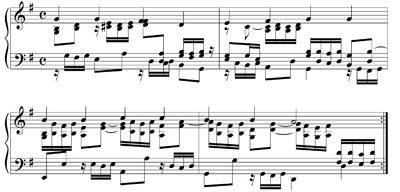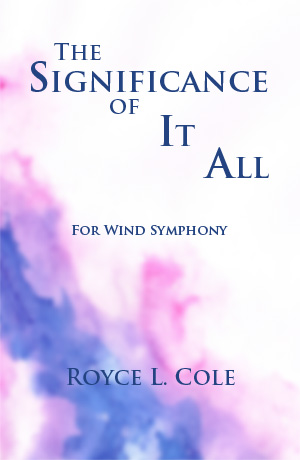|
Click here to view perusal score. |
INSTRUMENTATION: picc, 2fl, 2ob, 3cl, bcl, 2bsn, 2asax, tsax, bsax, 4hn, 3tpt, 3tbn (1 bass), euph, tba, db, timp, 4perc, pno perc 1: glockenspiel AVAILABILITY:
Note: The most recent version of the item will be shipped. This may include, but is not limited to, cosmetic changes and revision of musical content (errata). |
RECORDINGS:
[soundcloud url=”https://api.soundcloud.com/tracks/137406958″ params=”color=ff9900&auto_play=false&hide_related=false&show_artwork=false” width=”100%” height=”100″ iframe=”true” /]World Premiere Performed by Wayne State University Wind Symphony on February 18, 2014
Jeffrey J. Jones, conductor
[soundcloud url=”https://api.soundcloud.com/tracks/158214945″ params=”color=ff9900&auto_play=false&hide_related=false&show_artwork=false” width=”100%” height=”100″ iframe=”true” /]Performed by Blue Lake Fine Arts Camp Staff Band on July 4, 2014
Dr. Wesley Broadnax, conductor
DETAILS:
When Jeffrey Jones approached me to write the piece, I was not familiar with the chorale or the poem. I spent a lot of time either listening to the piece or reading the poetry before I even started writing sketches for the work. I wanted to commit them to a more subconscious level so that when I wasn’t at the piano I could think back to either work.
I wanted whatever music was written to come naturally from thoughts regarding the music and poem. Much like the beginning of the work, melodies started to emerge slowly and build upon one another. Nearly all of the melodic material in The Significance of It All stems from the first three unique intervals of the Bach chorale. The melody at measure 71 is actually derived by the harmonic accompanying textures in the original chorale. At measure 245, there is a direct quote of the first four measures of the chorale melody.
The poem had imagery that was either musical in nature or incorporated musical terms. This seemed to lend itself naturally to providing influence in instrument choice or accompanying material to the melody. One line in particular struck me instantly when I read the poem:
Lastly, this work is also very personal to me. Jeffrey Jones was a pivotal music educator early in my career. While I was a student of his, he afforded opportunities and encouraged me to write several chamber ensembles pieces as well as my first work for concert band, Battle Angelis. Unfortunately, over the years we had lost touch with one another up until about a year prior to beginning work on this piece. This is a third item that heavily influenced the piece that was not provided directly as material by Jeffrey Jones, but instead through his years of mentorship and now continuing friendship.

Leaves Of Grass, Book III, Song Of Myself, Part 26
Walt Whitman
Now I will do nothing but listen,
To accrue what I hear into this song, to let sounds contribute toward it.
I hear bravuras of birds, bustle of growing wheat, gossip of flames,
clack of sticks cooking my meals,
I hear the sound I love, the sound of the human voice,
I hear all sounds running together, combined, fused or following,
Sounds of the city and sounds out of the city, sounds of the day and night,
Talkative young ones to those that like them, the loud laugh of
work-people at their meals,
The angry base of disjointed friendship, the faint tones of the sick,
The judge with hands tight to the desk, his pallid lips pronouncing
a death-sentence,
The heave’e’yo of stevedores unlading ships by the wharves, the
refrain of the anchor-lifters,
The ring of alarm-bells, the cry of fire, the whirr of swift-streaking
engines and hose-carts with premonitory tinkles and color’d lights,
The steam-whistle, the solid roll of the train of approaching cars,
The slow march play’d at the head of the association marching two and two,
(They go to guard some corpse, the flag-tops are draped with black muslin.)
I hear the violoncello, (’tis the young man’s heart’s complaint,)
I hear the key’d cornet, it glides quickly in through my ears,
It shakes mad-sweet pangs through my belly and breast.
I hear the chorus, it is a grand opera,
Ah this indeed is music–this suits me.
A tenor large and fresh as the creation fills me,
The orbic flex of his mouth is pouring and filling me full.
I hear the train’d soprano (what work with hers is this?)
The orchestra whirls me wider than Uranus flies,
It wrenches such ardors from me I did not know I possess’d them,
It sails me, I dab with bare feet, they are lick’d by the indolent waves,
I am cut by bitter and angry hail, I lose my breath,
Steep’d amid honey’d morphine, my windpipe throttled in fakes of death,
At length let up again to feel the puzzle of puzzles,
And that we call Being.



